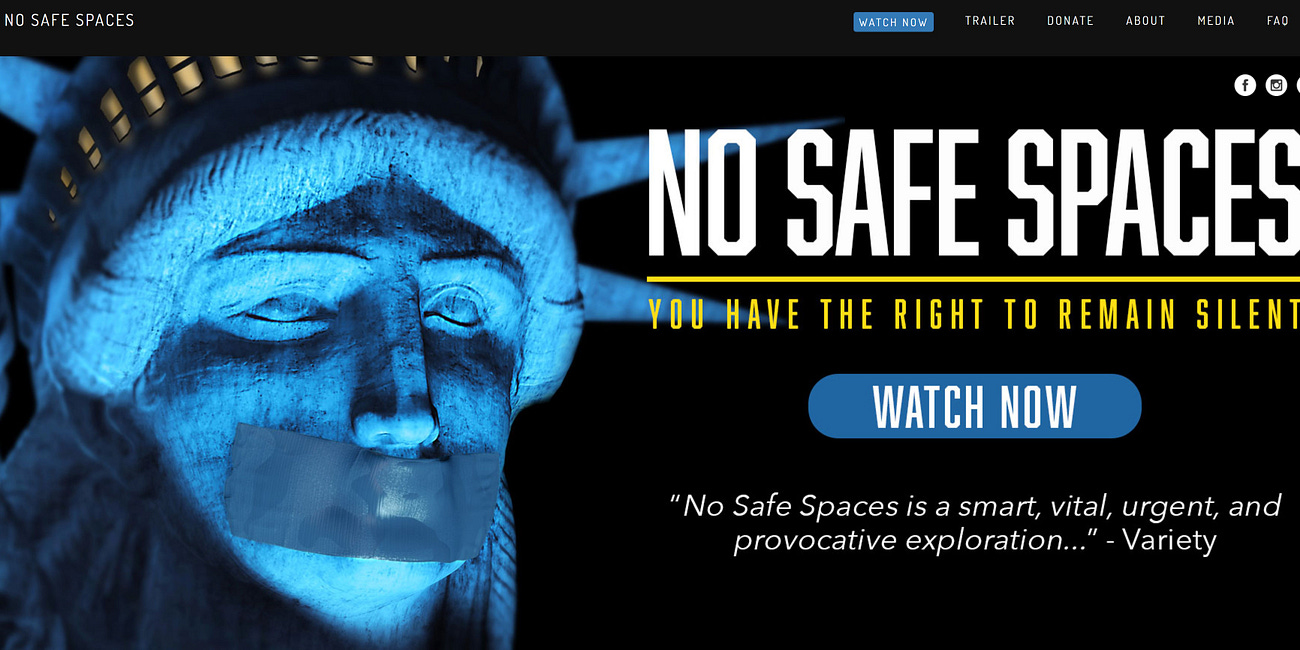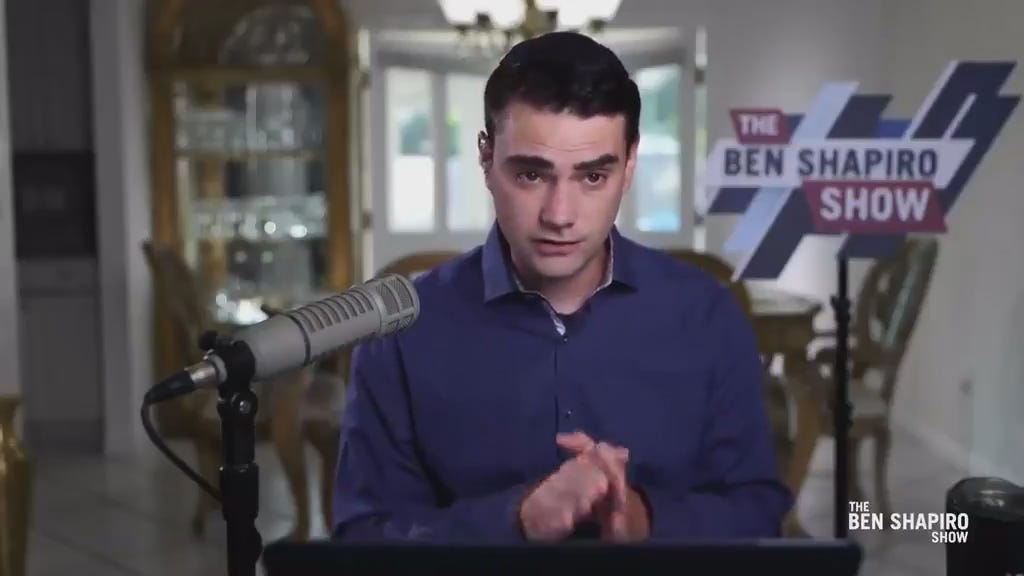WALSH: Abbott has been impressive recently in his mission to defend the southern border, despite the Biden administration's efforts to prevent him from doing so, and so I am loathe to cancel him in the midst of that fight, but he has left me no choice.
Here's the report from the ABC affiliate in Austin.
VIDEO: The Israel-Hamas war has sparked protests around the world and in Austin. It's chants like these...and other incidents at public universities that led Governor Greg Abbott to issue an executive order to fight anti-Semitism on college campuses. It requires universities to review and update free speech policies, include the definition of anti-Semitism in those policies, and enforce those policies, which could include expulsion. A move members of the American Civil Liberties Union of Texas say could set off a wave of problems. When the government starts to infringe on protected speech and when the government starts to practice viewpoint discrimination, that has a trickle-down effect to all sorts of populations. The governor pointed to a rise in anti-Semitic acts and took aim at two student organizations, including UT's Palestine Solidarity Committee, which has led several protests. So the governor naming two specific student-founded organizations as organizations that are practicing hate speech or that are in violation of his order is viewpoint discrimination in a really explicit way.
WALSH: So Governor Greg Abbott here has committed the ultimate sin. He has forced me to agree with a woman from the ACLU with pronouns next to her name. The ACLU is rarely correct about anything these days, and people with pronouns next to their name are correct even less often than that. But in this case, they happen to have stumbled on the truth as Abbott signs an executive order to fight anti-Semitism on college campuses. And what does fighting anti-Semitism mean? Well, here's the statement that the governor's office put out this week. Quote, Governor Greg Abbott today issued an executive order to fight the increase in access to anti-Semitism at colleges and universities in Texas and ensure a safe learning environment for Jewish students and all Texans. Quote, anti-Semitism is never acceptable in Texas and we will do everything we can to fight it, said Greg, Governor Abbott. The state of Texas stands with Israel and the Jewish community and we must escalate our efforts to protect against anti-Semitism at Texas colleges and universities and across our state. Across the country, acts of antisemitism have grown in number, size, and danger to the Jewish community since Hamas's deadly attack on October 7th. Texas took immediate action to protect Jewish schools, synagogues, and other key locations. Many Texas colleges and universities have also acted quickly to condemn antisemitism. So, this is an executive order targeting what he describes as antisemitic acts and rhetoric. In fact, he's ordering colleges in the state to establish appropriate punishments for this rhetoric, which he deems antisemitic. And he says explicitly that these offensive statements must be shut down so that college campuses are safe spaces for Jewish people.
Now, I seem to remember Republicans spending the past, I don't know, 10 years complaining about the safe space mentality on college campuses. And now here we have the Republican governor of Texas issuing an executive order commanding college campuses to be safe spaces. So we seem to have lost the plot here somewhere along the line. There are a lot of reasons why governors should not be issuing executive orders to combat antisemitism or any other form of bigotry, but I'll focus on just three of those reasons.
First of all, violence, vandalism, threats, and deliberate incitement are already illegal. Now, some have defended this executive order by arguing that its real intent is to crack down on these sorts of crimes that are committed against Jewish people. But again, these are crimes. They're already illegal. If they're happening anywhere in Texas, whether on a college campus or not, the state already has all of the authority it needs to arrest and prosecute the culprits.You don't need to make an illegal thing even more illegal.
You don't need an executive order making it extra illegal. Just enforce the laws that are already on the books.
So, if, say, somebody is vandalizing a synagogue or assaulting a Jewish person or explicitly calling for violence against Jews, they can already be arrested. This order will do nothing to stop or punish those crimes because they already have the laws in place to stop or punish those crimes. And if somehow they didn't have the laws in place, if, let's say, Texas had forgotten to make vandalism or assault illegal, well, the solution would be to pass a law making those violent acts illegal. But even then, this executive order would be the wrong way to do it. One, because it's an executive order, not a law. And two, because it seeks to protect one particular group instead of all groups. So vandalism, assault, etc., they are wrong no matter who they target. They are equally wrong no matter who they target. They should be prosecuted with equal vigor regardless of the demographics of the victim.
We do not need laws protecting Jewish people. We need laws protecting people to include Jews, obviously, and everybody else. And if we already have those laws, which we do, then we don't need a second law or order making these crimes extra specially illegal if you commit them against a certain group.
But the real point here has nothing to do with physical crimes. The real point is the bit about anti-Semitic rhetoric, which brings us to the second problem related to the issue that I just raised in the first. Let's pretend for a moment that we all agreed that so-called hate speech should be banned from universities. Let's pretend that hateful rhetoric really had no place in Texas or anywhere else, as the governor would say. Now, I don't agree with this idea, as I'll explain in a moment, but let's grant it for the sake of argument. Well then, why wouldn't the executive order establish appropriate punishments, quote-unquote, for hateful rhetoric against anyone of any group? And if, for whatever reason, it was decided that we needed to actually specifically outline every single group that you cannot say hateful things about, then why are certain groups conspicuously left off the list?
It is rather hard to imagine Greg Abbott ever issuing an executive order calling for punishments for anti-white rhetoric on college campuses, in spite of the fact that anti-whitism is not only incredibly pervasive on every major university campus in the country, but it's also part of the curriculum. Students are forced to listen to anti-white screeds in the classroom from their professors. Every hateful thing imaginable has been said on college campuses about white people by staff, by administrators, by professors, let alone also, of course, the students.
Yet, to my knowledge, Greg Abbott has never issued an executive order addressing that. Why is that?
You could, again, easily kill all these birds with one stone if you just banned all hateful statements against all people, but he doesn't do that. That doesn't happen anywhere. Instead, certain groups are singled out for protections, while certain groups are given no special protections at all.
Third, I make that last point, as I said, for the sake of argument. My actual position is that there should not be any hate speech laws or policies at all. I reject hate speech as a concept, as a category. Hate speech, if it's anything, is simply speech that expresses hate. And some speech does express hate. But what I reject is the idea that any governmental authority should ever be in the business of trying to read the mind of a speaker and determine whether there was hatred behind it, and then punish the statement based on their own interpretation of the emotional state of the person who made the statement. I reject that completely. I also reject the idea that any form of rhetoric. And all should be banned or punished on college campuses. Threats and incitements are already illegal, as we've established. So putting those aside, we are left with opinions, claims, ideas, exhortations, declarations. And as for those, even if they're wrong, even if they're baseless, even if they're offensive, even if they are, yes, hateful, they should not be banned or punished, and they certainly should not be the subject of an executive order from the governor's office. We cannot pretend to care in the slightest bit about free speech if we are banning speech on the basis that it's hateful towards protected groups. This is not just an infringement on free speech. It is the total eradication of free speech. Because after all, the only kind of speech that really needs legal protection in the first place is the speech that is deemed hateful and inappropriate by the powers that be. Speech that is pleasant and uncontroversial and friendly and gentle. That doesn't need to be protected. I mean, you could live in a country with no free speech. You could live in North Korea. You could be locked up in a communist prison camp and you'd still be able to say all those sorts of things. So when a person in power says, you have free speech, unless it's speech that I find to be really inappropriate personally, that's another way of saying that you don't have free speech. And this point, I would think, is obvious. Now, I don't know exactly what sort of speech the governor considers anti-Semitic. That's a big part of the problem here, because what we know is that any popularly used label for any particular form of bigotry is in a constant state of expansion.
So bigotry labels, they're like the universe. Their boundaries expand and expand and expand until they become as broad and all-encompassing as the universe itself. That's reason enough why you can't ban speech on this basis. Any speech at all could be included in the label because the labels are so broad and so subjective.
But let's narrow the scope here just for a moment. Because in reality, to be antisemitic is to hate Jewish people because they are Jews. That's what antisemitism is. Everything that is not that is not antisemitism. You could say a lot of other things about Jewish people that you can make a lot of other statements that are incorrect. You can even say things that are offensive. But unless they express that you hate Jewish people for being Jews, they're not anti-Semitic. Just like being racist against a particular race means that you hate the members of that race because they are members of that race. And again, you could say a lot of other things about people of a certain race that maybe are incorrect. You could even engage in stereotypes. You could have misapprehension. You could have misunderstandings. You could say a lot of things. But unless you're expressing that you hate these people because they're members of the race, it is not racist. Now, I realize this is the narrowest, most limited definition of these terms, and it's also the only coherent and clearly delineated definition. If you expand it beyond these boundaries, you will quickly find that now there are no real boundaries and anything can be included. So what if somebody says something that is really clearly anti-Semitic? What if they stand up and they say, this will be the clearest version of all, I hate Jews. What if they said that? Well, there's no denying that such a statement is anti-Semitic. There's no denying that likely statements like that have been made on college campuses.
Should there be an executive order or law prescribing punishments for such expressions? No, of course not. If a person hates Jews, they should be allowed to say so without any legal repercussions. If they hate black people, if they hate Asians, if they hate gay people, if they hate Christians, if they hate white people, if they hate me, if they hate you, if they hate anyone for any reason, they should be allowed to say it. And they are allowed to say it about some of those groups. They should be allowed to say it about any of them. Because you know what? People can feel how they feel and they can say how they feel. And if free speech doesn't mean that at least, then it doesn't mean anything. So how should we respond to somebody who says such things? How should we answer a true expression of hate? Well, through speech. Fight speech with speech. Why is that such a difficult concept? On a college campus, we should be teaching students how to communicate their disagreement and disgust and revulsion through speech of their own. They shouldn't need a quote-unquote safe space to retreat to. They shouldn't need the governor to come save them. If they don't like something that somebody has said, they can say so and they can explain why. Now, that's not going to stop the other person from saying it, but that's the way it works in life or how it should work.
You don't get to control what other people think. And you don't get to control what other people say. Unless you're Greg Abbott, apparently, which is why he is today cancelled.
Well said, Matt. You may have just pissed off some powerful people. I wish you continued employment/self-employment.
Further reading:













